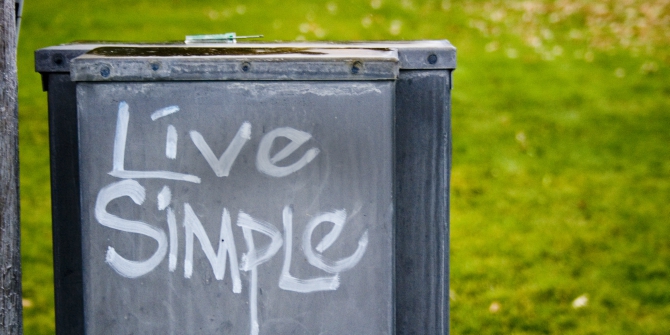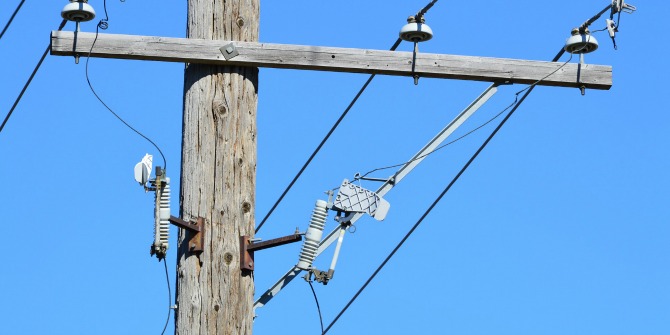
This post explores the relationship between some relatively new concepts in economics – slow living, slow food, slow writing and the green economy. The goal is twofold – discussing the possibilities opened by these exciting new concepts, in terms of an increase in the quality of life combined with an environmentally sustainable lifestyle, as well as ascertaining what they may entail in the context of the recent economic crisis which may make green and slow living seem like a distant dream.
What is slow living?
‘Slow living means structuring your life around meaning and fulfilment. Similar to “voluntary simplicity” and “downshifting,” it emphasizes a less-is-more approach, focusing on the quality of your life.’ (Meredith and Storm, 2009) It is very close to the view proposed by green economists, who underline the marked difference between concepts like ‘standard of living’ and ‘quality of life.’ (Holden, 2000) The two concepts, frequently used interchangeably, are in fact different. Standard of living measures economic welfare (satisfaction in monetary terms), while quality of life includes concepts like the quality of the environment, cultural activity and religious or spiritual aspects.
Slow living does not necessarily mean doing things slowly, but rather adjusting the speed of your activity to the goal you want to accomplish, and pacing yourself when necessary.
‘Slow economics’, though present in conferences and summits, are not yet a part of mainstream economics. Quite the contrary, the slow living movement (with its spin-offs, such as ‘slow economics’, the slow food movement and so on) go against the main trend. This is no surprise, since economics has been long dominated by concepts such as ‘economic growth’. The latter fundamentally opposes the underlying principles of the slow living movement, which shifts the focus from growth for the sake of growth to sustainable growth, limited by the availability of local resources and favouring quality (of food, of life, of education) over quantity. Such an approach strongly opposes some of the concepts our current way of life is based on: efficiency, professionalism, speed. As Parkins and Craig note, this is not an accidental occurrence, and forms the basis of this new philosophy. (Parkins and Craig, 2006)
What is slow food?
Put simply, the opposite of fast food. The example Finkelstein gives is quite revealing: ‘Fast food, for example, while obviously convenient, robs us of essential nutrients that our bodies need to function properly. In addition, it eliminates the creativity, love, and community associated with food that is made with fresh ingredients from local farms and that is prepared by people we hold dear.’ (Finkelstein, 2014)
‘The Slow Food movement is arguably one of the focal points of the broader interest in slow consumption and lifestyles.’ (Hall, 2012) Hall resorts to Cooper’s arguments in saying that ‘there is a need to slow the rate at which raw materials are transformed into products and services and eventually discarded as “waste”’ (Cooper, 2005, as seen in Hall, 2012). The thought alone would be a blasphemy for traditional economists, as the italicized phrase can have just one translation – there is a need to slow down economic growth. Hall also notices that the connection to corporate socially responsible activities is illustrated in Kotler’s (1991) societal marketing concept, which is doing business in a way that maintains or improves both the customer’s and society’s well-being.
Being constantly busy is to our mind one of the greatest problems of our time, as it prevents most people from taking the time to assess their lives and ‘see the big picture’. You cannot solve a problem, as Einstein said, from the same level of awareness that created it. Thus, the fact that people cannot find the time for reflection on their lives might give us a clue to why they cannot find solutions for the increasingly complex problems they encounter.
Placing family life, leisure time activities, friends, between imaginary ‘brackets’ and assigning for them a secondary role, always positioned after work, is damaging to both the quality of our personal relationships, but also eventually to the quality of our work. It is completely unrealistic to expect a work ridden, increasingly isolated individual to perform excellently at his/her workplace, while being deprived of some of the essential elements that make up a healthy personality. Thus, slow living is more than a spur-of-the-moment reaction to the difficulties of an increasingly complex socio-economic environment. It is, first and foremost, a choice, ‘[…] the choice to live consciously with the goal of enhancing personal, community, and environmental well-being.’ (Siyang, 2014, p. 17)
What do we mean by ‘green’ economics?
Doubts over the purpose of economic growth have led some economists to question how economic success can be best evaluated. (Holden, 2000) These developments led to the appearance of green economics. The International Chamber of Commerce (ICC) defines green economy as ‘an economy in which economic growth and responsibility towards the environment work together and support each other, while sustaining social development.’ (International Chamber of Commerce (ICC), 2012)
Related to the history of green and ecological economics, we think it is worth mentioning Georgescu-Roegen, who was the first economist to say that all of Earth’s mineral resources will eventually be exhausted at some point. (Boulding, 1981) As he brought the flow of natural resources into economic modelling, Georgescu-Roegen’s work was crucial in establishing ecological economics, so he may be seen as one of the founding fathers of the discipline.
Slow living and the academia: in defence of slow writing
Our readership has changed. Readers who can break from the pressures of the modern world are rare. Most of us, lured by the ease granted by the new technology, unknowingly fall into the trap of the ‘five minutes reading’ scheme. We become ‘butterfly readers,’ swiftly going from website to website, and never satisfied. We rarely give our time completely over to a text that would demand our full attention, and abandon quickly.
The concept of ‘slow writing’, therefore, could offer us a way out of the ‘rat race’ in which we are forced by an insanely accelerated speed of life in a complicated, globalized, world. Slow writing has the following traits:
- It is the product of rumination, as it needs time to be produced and is a synthesis of experience and thought. It goes against the trend of hasty scholarship, promoting a philosophy of value, not just meeting the practical needs of academic life (getting promoted, writing scholarly articles etc.)
- It involves the reader, and makes him part of the creative process, assuming a certain complicity with the reader and a shared set of values.
- It respects and values the reader’s time, by providing a quality product contributing to his/her education, while promoting the traditional academic values of honesty and transparency.
Finally,what holds the concepts of slow living, green economics, slow food and slow writing together?
They have a common source and a common vision – the holistic approach opposing the dichotomist view in traditional economics. While traditional economics use standard of living to quantify happiness and measure wellbeing, these (relatively) new concepts accept the reality: we cannot put a price tag on quality of life, or use the same terms when we talk about human beings as when we refer to products. Such concepts do not view human beings as ‘resources’, or human life as something to be quantified and labelled. In opposition to the consumerist view held by many economists today, they state a simple fact: the focus in ‘slow living’ is on the second term, a term that most of us, busy producing, have very little time for nowadays.
While there are arguments on both sides (for and against the sustainability of green economies), the arguments favouring green economies prevail. The need for a paradigm shift is obvious, for the very simple reason that the old one (based on the concept of uncontrolled growth) is not working. In the words of Edward Abbey, ‘growth for the sake of growth is the ideology of the cancer cell.’ (Abbey, 1991)
[1] For instance, ‘The Slow Living Summit’, organized since 2011, and featuring well-known personalities from various domains –one example would be the presidential candidate in the current US elections Bernie Sanders (http://www.slowlivingsummit.org/).
♣♣♣
Notes:
- This blog post is based on the author’s paper Slow Living and the Green Economy, in The Journal of Philosophical Economics, Vol. 9, No. 2, April 2016
- The post gives the views of its author, not the position of LSE Business Review or the London School of Economics.
- Featured image credit: Live simple, by Kate Brady, under a CC-BY-2.0 licence
- Before commenting, please read our Comment Policy.
 Diana-Eugenia Ioncică is an Associate Professor at the Bucharest University of Economic Studies (BUES). She has a doctoral degree in Philology and is currently a doctoral student in ‘Green Economics’ at the BUES. (diana_ioncica@yahoo.com)
Diana-Eugenia Ioncică is an Associate Professor at the Bucharest University of Economic Studies (BUES). She has a doctoral degree in Philology and is currently a doctoral student in ‘Green Economics’ at the BUES. (diana_ioncica@yahoo.com)
 Eva-Cristina Petrescu is a Full Professor at the Marketing Faculty of the Bucharest University of Economic Studies. (eva_petrescu@yahoo.com)
Eva-Cristina Petrescu is a Full Professor at the Marketing Faculty of the Bucharest University of Economic Studies. (eva_petrescu@yahoo.com)





